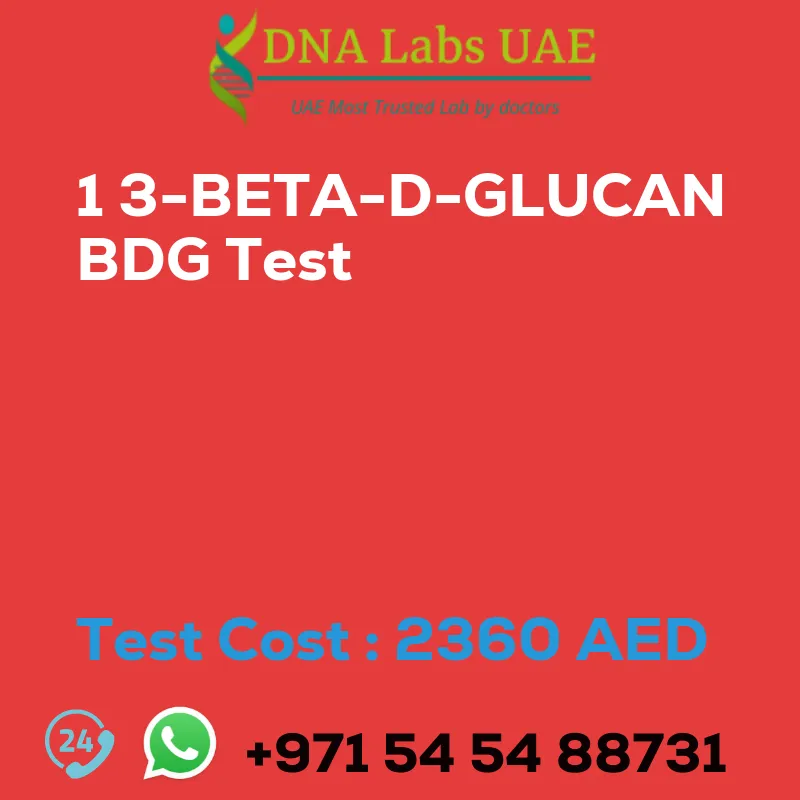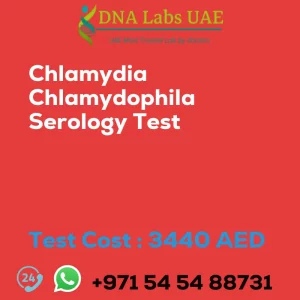1 3-BETA-D-GLUCAN BDG Test
Components: 2 mL (1 mL min.) serum from 1 Red Top (No additive) tube preferably Glucan free OR 2 mL (1 mL min.) BAL fluid in a sterile screw capped container OR 1 mL (0.5 mL min.) CSF in a sterile screw capped container. Ship refrigerated or frozen.
Price: 2360.0 AED
Report Delivery: 1 week
Method: Spectrophotometry
Test Type: Infections
Doctor: Physician, Oncologist
Test Department: DNA Labs UAE
Pre Test Information: No special preparation required
Test Details
The (1 3)-BETA-D-GLUCAN (BDG) test is a diagnostic test used to detect the presence of fungal infections in the body. Beta-D-glucan is a polysaccharide found in the cell walls of many fungi, including Candida species and Aspergillus species.
The BDG test involves taking a blood sample from the patient and measuring the levels of beta-D-glucan in the sample. Elevated levels of beta-D-glucan indicate the presence of fungal infection. This test is particularly useful in diagnosing invasive fungal infections, which can be difficult to detect using other methods.
The BDG test is often used in conjunction with other diagnostic tests, such as cultures or imaging studies, to confirm the presence of fungal infection. It is commonly used in patients with compromised immune systems, such as those undergoing chemotherapy or organ transplantation.
It is important to note that the BDG test is not specific to any particular type of fungal infection and cannot identify the specific fungal species causing the infection. Therefore, it is typically used as a screening tool rather than a definitive diagnostic test.
| Test Name | 1 3-BETA-D-GLUCAN BDG Test |
|---|---|
| Components | |
| Price | 2360.0 AED |
| Sample Condition | 2 mL (1 mL min.) serum from 1 Red Top (No additive) tube preferably Glucan free OR 2 mL (1 mL min.) BAL fluid in a sterile screw capped container OR 1 mL (0.5 mL min.) CSF in a sterile screw capped container. Ship refrigerated or frozen. |
| Report Delivery | 1 week |
| Method | Spectrophotometry |
| Test type | Infections |
| Doctor | Physician, Oncologist |
| Test Department: | |
| Pre Test Information | No special preparation required |
| Test Details |
The (1 3)-BETA-D-GLUCAN (BDG) test is a diagnostic test used to detect the presence of fungal infections in the body. Beta-D-glucan is a polysaccharide found in the cell walls of many fungi, including Candida species and Aspergillus species. The BDG test involves taking a blood sample from the patient and measuring the levels of beta-D-glucan in the sample. Elevated levels of beta-D-glucan indicate the presence of fungal infection. This test is particularly useful in diagnosing invasive fungal infections, which can be difficult to detect using other methods. The BDG test is often used in conjunction with other diagnostic tests, such as cultures or imaging studies, to confirm the presence of fungal infection. It is commonly used in patients with compromised immune systems, such as those undergoing chemotherapy or organ transplantation. It is important to note that the BDG test is not specific to any particular type of fungal infection and cannot identify the specific fungal species causing the infection. Therefore, it is typically used as a screening tool rather than a definitive diagnostic test. |








